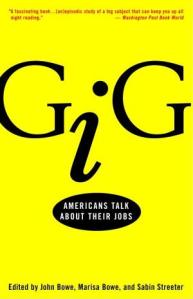Home » Posts tagged 'University'
Tag Archives: University
Gig: A Book for Students & Parents Curious to Explore Unique Careers
 Gig: Americans Talk About Their Jobs, edited by John Bowe, Marisa Bowe, and Sabin Streeter, is a tremendous resource that I wish I’d had as a kid growing up and thinking about what I wanted to be one day. For me, as it is with many people, the job market from my perspective as a high schooler was simply College. It had nothing to do with actual jobs. And when I was queried about what I’d do with my college degree? I’d just shrug and rattle off the usual suspects: teacher, activist, artist, etc.
Gig: Americans Talk About Their Jobs, edited by John Bowe, Marisa Bowe, and Sabin Streeter, is a tremendous resource that I wish I’d had as a kid growing up and thinking about what I wanted to be one day. For me, as it is with many people, the job market from my perspective as a high schooler was simply College. It had nothing to do with actual jobs. And when I was queried about what I’d do with my college degree? I’d just shrug and rattle off the usual suspects: teacher, activist, artist, etc.
And, while there’s certainly nothing wrong with this line of thinking or focusing on these (great!) jobs as possible careers, it was an incredibly limited view of the world and all that it can offer young, creative minds.
Thank goodness for books like Gig! Now, we don’t normally plug specific books here, but this one caught our eye as especially useful for both students and parents who may be dreading or just plain avoiding the topic of college majors and job opportunities altogether. This book is one of those rare finds that not only discusses unusual and “usual” jobs, but which actually provides honest (sometimes hilarious and sometimes heartbreaking) first-hand accounts of what it’s like to work these jobs from people who have been working them for years. As soon as I came across this book, I knew it was perfect for both students (of all ages) and parents as a tool to not only expand their thinking of their own potential but of the potential of jobs/careers that are not often thought of or considered desirable (such as long-distance truck driving or hatter work).
But, of course, more than jobs–this is a book of passions. Finding and practicing one’s passion in a career can be hard to accomplish–after all, it’s hard enough to even recognize the face(s) of one’s “true” passion(s) (especially at so early a stage in life as high school or college). This book includes narratives of some workers who are thrilled with their work and of others who are consistently disappointed in it. What’s most impressive, however, is that these narratives don’t leave things at “I don’t like it” or “It’s great!” These narratives truly explore the ins-and-outs of different careers and why they’d work for some and be nightmares for others. If you’re looking for nuanced views of wild and varied jobs, then this is definitely a book to check out.
Even Ira Glass (the guy with one of the coolest jobs in the U.S. as host of This American Life), raved that Gig was “…surprising and entertaining and makes the world seem like a bigger and more interesting place. Gig manages to document everyday life and give pure narrative pleasure at the same time. One feels proud to live in the same country as the people in this book.”
And, having read the book and felt both relief and envy at the many tales captured within, I couldn’t agree more. In other words, it’s a book that can help students begin learning about careers that require and don’t require college degrees, jobs that could take them all over the world, jobs that they may have misjudged for better or worse, and jobs that they may have never even known existed.
As Andrew Ross, Director of the American Studies Program at New York University, said of Gig: “In the age of advanced spin, this book accomplishes a very rare thing. It actually lets workers speak for themselves. . . . The result makes for a fascinating read.”
So, if you’re having trouble getting your students/kids excited about college or their career potential (or considering a new career move for yourself whether you’re a parent or child), this book is definitely a great way to spark a more nuanced and thoughtful conversation regarding the whole wild craze of career building and job searching.
How To Choose Your College Major
So, you’re about to graduate from high school and want to go to college… What do you want to major in?
For some students, this question is simple. For some, the answer has felt clear since the moment they learned what college was. But for yet other students, this question is a bitter specter haunting them at every turn and just waiting to ruin their day.
What that third group of students doesn’t always realize however, is that they’re in just as exciting a spot as the preceding groups, if not an even more exciting spot.
But let’s start from the beginning. When you first start thinking about how to spend your time in college, try asking yourself the following questions:
What exactly am I looking for in a college experience? What sort of careers interest me the most? Do I want to learn a trade, socialize, philosophize, train for a specific job, figure myself out, or just start exploring all the other wild opportunities out there?
As many people will tell you, it’s just as important to go into college thinking about what you love as it is to go in thinking about what majors may seem stereotypically “better” for landing you that first college graduate job. The truth is, however, that some of the most stereotypically “better” or supposedly more lucrative majors (such as pre-law or business) can often lead students down a path that doesn’t interest them and that doesn’t have the pay-out they were planning on upon graduation. The truth is, choosing the major that interests you most is useful not simply because of its innate ability to grab and motivate you, but because they can often lead you to think more creatively about your coursework’s application in a variety of settings and thus set you apart from other prospective employees in the job market later on.
One of the biggest non-secret secrets about college and the job market is that both are currently well overrun with business majors who are only there out of a supposed lack of interest in other things (despite the fact that business courses and degrees can be incredibly useful, challenging, and fascinating if approached with creativity, interest, and self-motivation), and law students who discover too late that lawyering is oftentimes more akin to being unemployed than being Boston Legal’s Alan Shore.
So, when you begin thinking about what major to focus yourself on, begin by trying to answer one of the toughest yet most basic of questions:
What sort of careers interest you the most?
And, regardless of what that answer happens to be, an important first step to making meaningful college decisions is actually to turn straight to the heart of the issue – research into who currently holds those positions you’re most interested in (Who are the high powered lawyers you admire? Who are the judges, CEOs, artists, and doctors?), and have your parents and teachers help you craft a formal letter or email to send out to this individual(s) asking them what they’d suggest, what their careers have looked like over the years, and what they look for in prospective employees.
This isn’t something many students think of, but it’s actually usually fairly easy research to do and can often yield surprisingly fruitful results. This isn’t to say that everyone will always (or even in most cases) answer your letters, but you never know who might actually get back to you and what advice they might be able to give about what majors, courses, and skills they’d be most interested to see in their employees or what skills they find most useful in their own daily work.
Another important initial step in the major-choosing process is to meditate upon one’s self and upon one’s strengths and weaknesses.
As Darin Ford, Director of the Hegi Family Career Development Center at Southern Methodist University, told US News in 2011,
Essentially, KNOW THYSELF. That most classic of philosophies can be one of the most vital to you when trying to decide what major to commit to—almost as important as maintaining an open mind. After all, even if you’ve always loved reading and writing and just know that an English major is the right thing for you, that doesn’t mean you should feel comfortable ruling out the possibility of a STEM minor or turning down an opportunity to take that stray class on the French Revolution or Macro Economics.
In other words, don’t forget about the Multitudinous nature of the world just because you’ve found your talent and your love early on.
Best advice? Simplest advice?
- Don’t go looking for passions. They’ll find you and they won’t be in any one thing – passions are BIG.
- Don’t be afraid to change your mind – being curious is a virtue that will keep you healthier and happier than you know.
- Don’t be afraid to simply wait until college to make these kinds of decisions. Each college is different, after all, and you never know which professor will be able to speak your special language and put things in perspective for you.
- Think about what role model you want to be and what changes you want to make in the world. Do you want to be the first woman president of the United States? Do you want to be a STEM star? Do you want to reach out to those in need? Do you want to devote your life to the Romantics or the Sciences? Do you want to help make Science Romantic?
- Seek advice as often as you can. Ask professors what they’d recommend, talk to career counselors, talk to people who already hold your “dream job,” talk to your friends, your parents, your spiritual mentors. You don’t need to listen to all or any of them, but talking with them will yield you more possibilities and more options than you could’ve ever hoped for, and will show you just how Big the world actually is.
- Don’t let anyone make you feel bad about the decisions you ultimately make. Be proud, work hard, and take responsibility.
Good luck!

